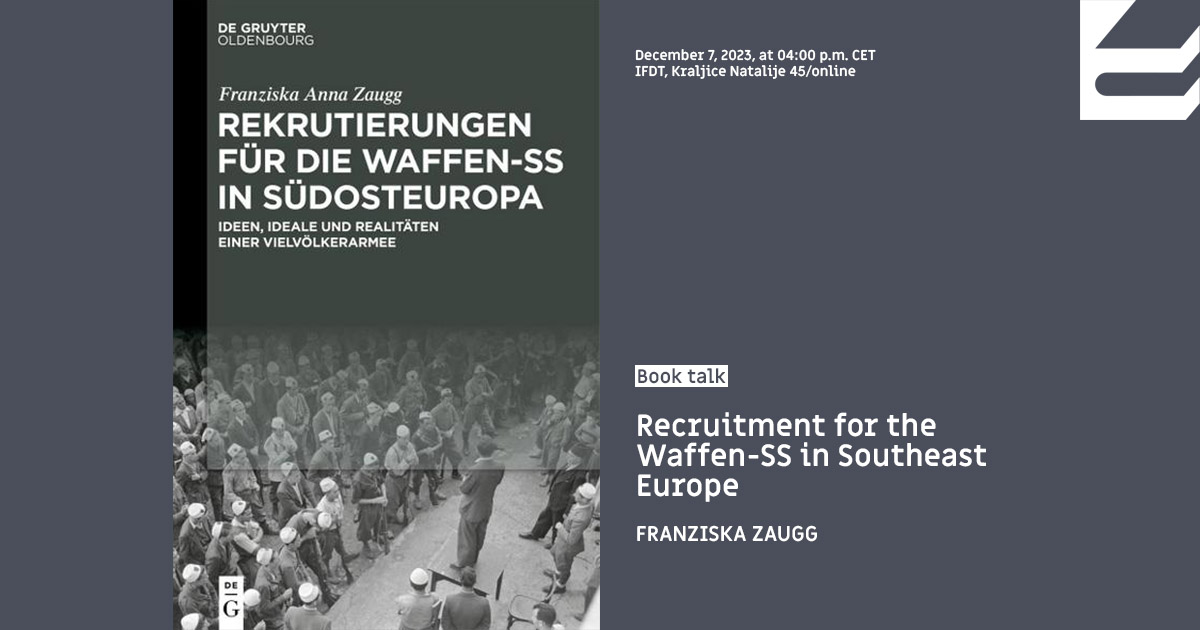
[Book talk] Franziska Zaugg – Recruitment for the Waffen-SS in Southeast Europe (ShoahLab)
Dr. Zaugg’s book “Recruitment for the Waffen-SS in Southeast Europe. Ideas, ideals and realities of a multi-ethnic army”. (original title: Rekrutierungen für die Waffen-SS in Südosteuropa. Ideen, Ideale und Realitäten einer Vielvölkerarmee) addresses a significant gap in the exploration of the Waffen-SS, specifically focusing on the southeastern Divisions of the SS, and the recruitment strategies of the German occupying forces, as well as the motivations of local elites during the Second World War. What advantages do people hope to gain by cooperating with occupying regimes? What disadvantages do they face if they do not? These questions can be applied and fanned out like a prism to the recruitment for the Waffen SS during the Second World War in Southeast Europe. This study explains the intentions, strategies and scope for action of the occupying powers, national and local elites as well as the motivation and constraints of individuals against the respective local background. The focus is on the three southeastern European Waffen SS divisions ‘Handžar’, ‘Skanderbeg’ and ‘Kama’ and the ‘Prinz Eugen’ division, which was recruited from ethnic Germans. The recruitment for these four divisions covered six states and other border areas. Members from up to fifteen nations served in them. This multicultural composition had an impact on recruitment and everyday life, but also on operations and smoldering interethnic conflicts.
Dr. Franziska Anna Zaugg is an esteemed scholar and historian whose work has made significant contributions to the field of history. Since February 2022, she has been a lecturer at the Department of Contemporary History at the University of Fribourg and an Associate Researcher at the University of Bern. Previously, she was a Postdoctoral Fellow at University College Dublin/Center for War Studies (2015-2018) and an Early Career Reseacher in the Oxford University project “Transnational Resistance” (2016-2018). Her impactful research portfolio encompasses a multifaceted exploration of historical themes. With a focus on conflict history, she delves into the intricacies of transnational resistance movements and memory politics, unraveling the complexities of societal engagement with historical narratives. Dr. Zaugg’s work extends to the intersection of archives and society, shedding light on the role of archival institutions in shaping historical understanding. Her expertise spans Southeast European history during World War II, the involvement of Muslim associations in the Waffen-SS, and the developmental trajectories of Southeast European nations from the 19th to the 21st century. Additionally, she provides nuanced insights into the prelude to the Spanish Civil War in Spanish Morocco and Spain, the participation of Swiss nationals in the conflict, and Switzerland’s political stance. In addition to her scholarly pursuits, Dr. Zaugg is actively involved in academic initiatives and various research projects and co-founder of the international and interdisciplinary working group “History-Society-Violence” (Geschichte-Gesellschaft-Gewalt, since 2013).
